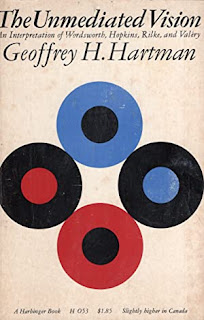Last December I was fortunate enough to borrow a copy of The Unmediated Vision, Geoffrey Hartman's first book, published in 1954. It is difficult to find a copy now but you can download a digital version of the book via the link. The opening chapter is a 50-page study of "Tintern Abbey" in the context of Wordsworth's work as a whole, focusing on the comparative simplicity of its language and imagery, and the problem of the agency of poet's imagination in the presence of the trees, rocks, rivers and waterfalls of the Wye Valley. He says Wordsworth strove "toward the expression of a mystic feeling...that no amount of thought can explain, and no feature of these objects considered in themselves can justify".
I was very moved by the essay, not least because, in addition to a close reading of the poetry, Hartman is deeply aware of the philosophical and cosmological tradition in which the poet worked. I realised that Nature as it was experienced in the time of the Romantics has certain parallels to my experience of literature in this unnamable time: the apprehension of something that is intimately our own and yet from which we are set apart. "The general body of Wordsworth's imagery" Hartman summarises "may be related to the idea of an inland ocean partially ebbed from the face of the earth, but visible in the distance, and audible everywhere—even to the top of the mountains."
What do we see and hear from the literature of our time? Everything, it seems, but a sense of that which enables and that which impends. Or should that be the literary criticism of our time?



